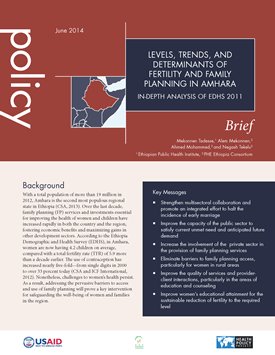The Health Policy Project ended in 2016. Work continued under Health Policy Plus (HP+) until 2022.
PUBLICATION
Author(s): Mekonnen Tadesse, Alem Mekonnen, Ahmed Mohammed, and Negash Tekelu
Primary Language: English
Date: 6/30/2014
Abstract:
This policy brief highlights the USAID-funded Health Policy Project's in-depth analysis of fertility and family planning trends in the Amhara Region, based on the Ethiopia Demographic and Health Survey (EDHS) 2011. The findings demonstrate that early marriage is pervasive in Amhara (leading to earlier childbearing), and that 22 percent of married women in the region have an unmet need for family planning. There are disparities in the uptake of family planning, with rural women and those with no formal education being particularly difficult to reach. The quality of family planning services was also found to be a barrier to family planning use, with many women receiving inadequate counseling about available contraceptive methods or side effects. Based on the study's findings, crucial actions are recommended for expanding and improving family planning services and reducing fertility in the Amhara Region, which can inform family planning policy development and advocacy in the region.
Advocacy Brief Capacity Development Contraceptive Security Family Planning/Reproductive Health (FP/RH) Gender Policy Repositioning Family Planning Ethiopia


